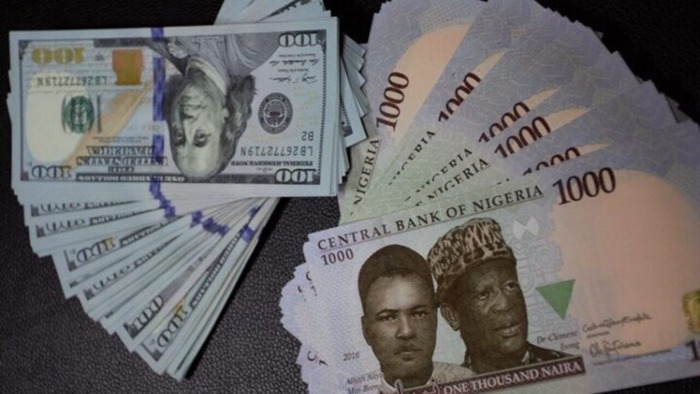The naira fell by 0.98 percent at the official foreign exchange (FX) market on Tuesday following strong demand for dollars, which gulped $465.29 million sold by banks.
After trading on Tuesday, the naira depreciated against the dollar to close at N1,433.89, weaker than N1,419.86 quoted on Monday at the Nigerian Autonomous Foreign Exchange Market (NAFEM).
Willing buyers and willing sellers, including commercial banks, sold $465.29 million on Tuesday, representing 20.39 per cent lower than the $584.53 million sold on Monday.
Intraday high strengthened to N1,519.78 on the spot on Tuesday as against N1,526 quoted for the past three trading days. Similarly, intraday low firmed to N894.99 per dollar from N906 quoted the previous day.
At the parallel market, also known as the black market, the local currency depreciated to N1,480 per dollar, representing 2.70 per cent weaker than N1,440/$1 exchanged on Monday.
The FX market in Nigeria witnessed a notable surge in the value of the Naira following adjustments made by the Central Bank of Nigeria CBN) aimed at bolstering dollar supply. This move resulted in three instances of Naira appreciation within a short span.
Data compiled by the FMDQ Securities Exchange Limited revealed that turnover in Nigeria’s FX market soared to $844 million on February 3, marking the highest trades recorded since June 2, 2022.
The increased turnover underscores the positive impact of the CBN’s reforms on market liquidity and investor confidence. These reforms are designed to enhance dollar availability and stability in the FX market, mitigating currency volatility and supporting economic growth.
Market analysts anticipate continued momentum in the FX market as investors respond positively to the CBN’s measures. The sustained appreciation of the Naira reflects growing optimism among market participants and bodes well for Nigeria’s overall economic outlook.
The CBN’s proactive approach to reforming the FX market demonstrates its commitment to fostering a conducive environment for foreign exchange transactions and promoting sustainable economic development.
Today, at the money market, the Central Bank of Nigeria (CBN) is set to carry out a Primary Market Auction (PMA) aimed at rolling over maturing Nigerian Treasury Bills (NT-Bills) worth N1 trillion. The auction will cover maturities across three different tenors: 91-day (N200 billion), 182-day (N200 billion), and 364-day (N600 billion).
The auction represents a significant move by the CBN to manage the country’s debt obligations and liquidity in the financial system. It is expected to attract participation from various investors, including banks, institutional investors, and other financial institutions.
Investors will keenly watch the auction results as they provide insights into market sentiment, prevailing interest rates, and the government’s borrowing costs. The auction’s outcome will also impact the direction of short-term interest rates and overall market dynamics.
The CBN’s decision to roll over NT-Bills maturities underscores its commitment to effective debt management and maintaining stability in the financial markets amidst evolving economic conditions.
According to a report by FSDH research, the Overnight (O/N) rate experienced a notable decrease of 5.90 percent, closing at 17.00 percent on Tuesday, compared to the previous day’s rate of 22.90 percent. Similarly, the Open Repo (OPR) rate witnessed a decline of 6.10 percent, settling at 16.00 percent, as opposed to 22.10 percent recorded on the previous day.
These reductions in O/N and OPR rates suggest a shift in market dynamics and liquidity conditions. The decline may be attributed to various factors, including interventions by monetary authorities, changes in market sentiment, and adjustments in banking sector liquidity management strategies.

